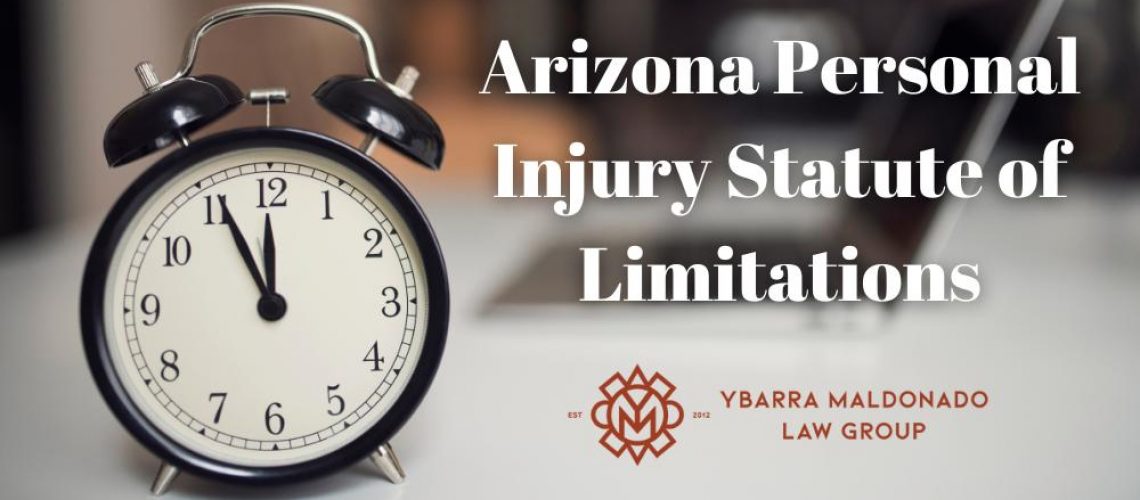Facing the aftermath of an injury can be overwhelming. When considering legal action, it’s crucial to understand the Arizona personal injury statute of limitations. The Arizona law surrounding these time limits can significantly impact your ability to seek compensation for your injuries. Here, we’ll delve into what a statute of limitations entails, how it operates in Arizona, exceptions to these limitations, and why seeking legal counsel from the Ybarra Maldonado Law Group in Phoenix is essential for navigating these complexities.
To schedule a free consultation with one of our skilled personal injury attorneys in Phoenix, please call our office at 602-910-4040 today.
What Is a Statute of Limitations?
A statute of limitations refers to the legally defined time limit within which an individual can file a personal injury lawsuit or claim after experiencing an injury or harm. This rule is in place to ensure that legal actions are initiated within a reasonable timeframe and to maintain fairness in the judicial process.
How Does a Statute of Limitations Work?
Once the specified time limit outlined by the statute of limitations expires, the injured party generally loses the right to bring a lawsuit or seek compensation for the injury sustained. Understanding and adhering to these time constraints are critical when pursuing legal action for a personal injury case.
What Are the General Time Limit Rules for Personal Injury Claims?
In Arizona, the statute of limitations for most personal injury lawsuits is two years from the date of the injury. It’s crucial to initiate legal proceedings within this timeframe to preserve your right to seek compensation.
For example, imagine that someone gets into a car accident. The victim only has two years from the date of their accident and injuries to file a personal injury claim. In that claim, they can seek damages for their injuries, personal property, and non-economic damages.
What Is the Discovery Rule in Arizona?
Arizona applies the discovery rule in certain personal injury cases. Under this rule, the statute of limitations may begin from the date when the injury was discovered or when it reasonably should have been discovered. This rule helps account for situations where injuries aren’t immediately apparent or are discovered later.
For example, many car accident victims sustain traumatic brain injuries like concussions. Concussions often don’t produce symptoms until days after accidents occur. The discovery rule allows victims to file Arizona personal injury claims and have the clock start counting down on the day they discover their injury.
What Are the Exceptions to Arizona’s Personal Injury Statute of Limitations?

Understanding exceptions to the standard statute of limitations is crucial, as they can impact the filing deadline for your case. In the following sections, we outline the exceptions to Arizona’s general time limits for personal injury lawsuits.
Medical Malpractice
In Arizona, medical malpractice cases have a statute of limitations of two years from the date of the malpractice or from the date of discovery.
Wrongful Death
For wrongful death cases resulting from negligence or intentional harm, Arizona allows a two-year statute of limitations from the date of death.
Product Liability
Claims involving defective products in Arizona generally have a two-year statute of limitations from the date of injury. However, victims may not initiate a product liability over 12 years after the product was first sold for consumption or use. This is the case unless the claim is based on manufacturer or seller negligence or breach of express warranty.
Cases Involving Children Under 18
For minors involved in personal injury cases, Arizona typically extends the statute of limitations. The two-year limit begins on the minor’s 18th birthday, allowing additional time to file a claim. This also applies to victims who were of “unsound mind” at the time of the injury. The clock starts to run once the victim’s “legal disability” is removed.
Claims Against Public Entities
When filing a claim against a government entity in Arizona, there are specific notice requirements and a shortened time limit of 180 days to file a formal claim. If a claimant misses the 180-day deadline, they are barred from filing a claim.
Defendant’s Absence
In cases where the defendant leaves the state or conceals their identity, Arizona law allows for a tolling, or pausing, of the statute of limitations until the defendant is located or identified.
What If I Miss the Filing Deadline?
Missing the filing deadline set by the statute of limitations can jeopardize your ability to seek compensation. In most personal injury cases, the court will dismiss the lawsuit if filed after the expiration of the time limit. Don’t risk missing the filing deadline – contact a personal injury lawyer as soon as possible after your accident.
Does the Personal Injury Claim Have to Be Resolved by the Filing Deadline?
The statute of limitations governs when a lawsuit must be initiated, not necessarily concluded. However, it’s essential to initiate legal proceedings promptly to allow sufficient time for investigation, negotiation, and potential trial proceedings. It’s important to initiate personal injury cases as soon as possible to avoid missing the deadline and to give your case more weight.
Examples of Cases That Could Lead to a Personal Injury Lawsuit

Many different accidents and cases can result in civil lawsuits for personal injuries. Some of the most common personal injury claims include the following.
Car Accidents: Often caused by reckless driving, speeding, DUI, distracted driving, or failure to follow traffic laws, resulting in injuries to drivers, passengers, pedestrians, or cyclists.
Slip and Fall Accidents: Occur due to hazardous conditions like wet floors, uneven surfaces, poor lighting, or lack of warning signs in public or private premises, leading to injuries such as fractures, sprains, or head trauma.
Medical Malpractice: Injuries or harm caused by healthcare professionals’ negligence, including misdiagnosis, surgical errors, medication errors, or inadequate patient care.
Product Liability: Injuries caused by defective or dangerous products, including malfunctioning machinery, unsafe pharmaceuticals, contaminated food items, or poorly designed consumer goods.
Dog Bites: Injuries resulting from dog attacks or animal-related incidents due to the owner’s failure to control their pet or take necessary precautions.
Premises Liability: Injuries sustained on another person’s property due to inadequate maintenance, lack of security measures, or negligence in addressing known hazards.
Construction Accidents: Injuries suffered by construction workers due to unsafe working conditions, faulty equipment, falls from heights, or other construction-related incidents.
Wrongful Death: Instances where an individual’s death occurs due to another party’s negligence or intentional actions, leading to potential claims by surviving family members.
Call a Phoenix Personal Injury Lawyer with Ybarra Maldonado Law Group
Navigating the legal intricacies of personal injury law, especially regarding the statute of limitations, requires experienced guidance. At Ybarra Maldonado Law Group in Phoenix, our team of skilled attorneys understands the nuances of Arizona’s statutes. We can provide invaluable legal counsel and representation.
When dealing with personal injury cases, time is of the essence. Don’t delay seeking legal advice if you’ve suffered an injury. Contact Ybarra Maldonado Law Group today to explore your legal options. We will ensure your rights are protected within Arizona’s statute of limitations framework. Call our office today at 602-910-4040 to schedule a free consultation.


